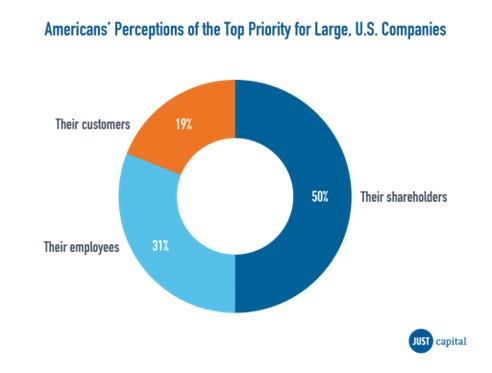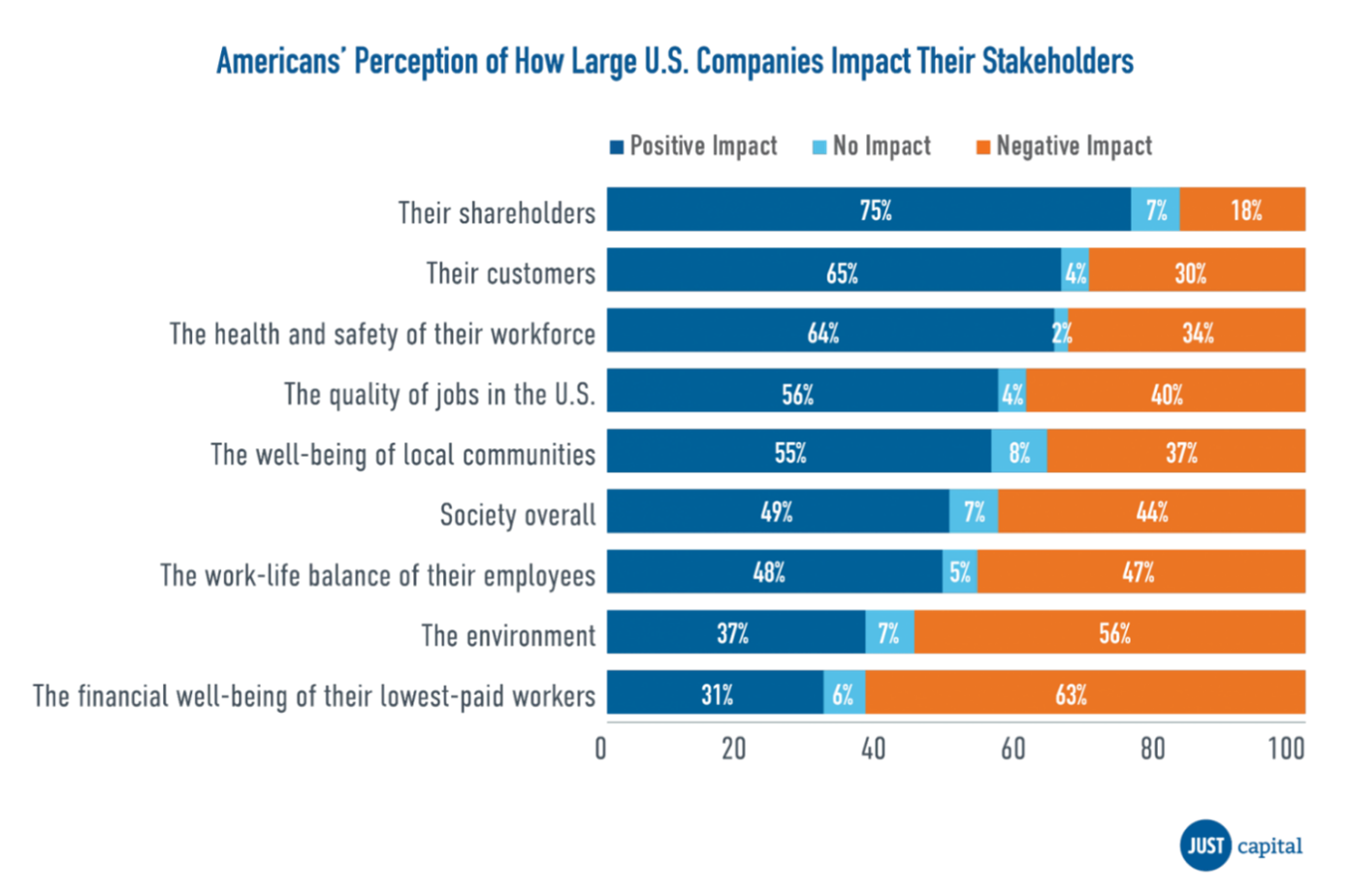JUST Capital Survey Highlights the Key Source of Waste in Shareholder Capitalism
By Bruce Bolger
Americans Seek the Benefits of Stakeholder Capitalism Without Knowing What it Is
The Hidden Costs of Shareholder Capitalism Revealed
The Stakeholder Capitalism movement has shown little sign of gaining widespread attention or corporate focus, based on a recent JUST Capital survey released this past week timed for publication on the third anniversary of the Business Roundtable pronouncement. In addition, there was almost no coverage in the national media covering the anniversary or assessing the state of the movement, as did occur around this time last year.
Although the JUST Capital survey did not attempt to analyze the economic impact of a failure to shift to Stakeholder Capitalism principles, survey respondents provided an indication of why a focus on shareholders leaves profits on the table along with the hidden damage of caused by unnecessarily unpleasant customer and employee experiences.
Americans Seek the Benefits of Stakeholder Capitalism Without Knowing What it Is
Despite the almost total lack of media coverage and awareness of the movement, the survey reveals that more than 90% of Americans believe in the economic benefits of Stakeholder Capitalism:

- 94% want to see businesses contribute to an economy based on serving all Americans.
- 95% want to see businesses help build an economy in which each person can succeed through hard work and creativity.
- 92% want to see businesses help build an economy that allows each person to lead a life of meaning and dignity.
- Promote an economy that serves all Americans (48%).
- Build an economy that allows each person to succeed through hard work and creativity (54%).
- Build an economy that allows each person to lead a life of meaning and dignity (48%).
The Hidden Costs of Shareholder Capitalism Revealed
The study also reveals the hidden costs of a shareholder-first business model: over one-third of customers and employees believe that large companies have a negative impact on them (see chart below), suggesting that a lot of people have little loyalty to the companies they work for or buy from. These findings largely correlate with the latest Gallup survey of employee engagement as well as the American Customers Satisfaction Index findings both showing employee and customer satisfaction at near record lows.
These finding helps explain the high cost of the current Shareholder-focused business model: an estimated $7.8 trillion in waste due to low employee engagement, according to Gallup. A lot of this waste is due to the inability of organizations to make the connection between customer and employee engagement, based on the work on the “Service Value Profit Chain” by Harvard Business School professors James L. Heskett, Thomas O. Jones, Gary W. Loveman, W. Earl Sasser, Jr., and Leonard A. Schlesinger, first presented in the 1990s. Organizations leave money on the table when they fail to connect employee and customer satisfaction. “The service-profit chain establishes relationships between profitability, customer loyalty, and employee satisfaction, loyalty, and productivity.”
Further support for the impact of employee satisfaction and financial returns interestingly comes from professors in China in a recently published study by Chenyu Shan and Dragon Yongjun Tang, “The Value of Employee Satisfaction in Disastrous Times: Evidence from COVID-19” (March 30, 2022).” It finds that “employee treatment is an important but challenging element of corporate environmental, social, and governance (ESG) policies. Satisfying employee needs can increase corporate productivity but is also costly to shareholders. Using unique data for Chinese publicly listed firms, we show that having satisfied employees is valuable to the firm. Specifically, firms with higher employee satisfaction scores withstand COVID-19 better, in terms of stock market performance. Such an effect is more pronounced for firms with more intangible assets and in knowledge-based industries. Moreover, higher employee satisfaction scores predict better operating performance. While not fully revealed in tranquil times, the effect of employee satisfaction is materialized when the firms experience negative shocks, such as COVID-19. Our findings suggest that firms can do well in crisis periods by doing good in normal times.”
In other words, there is a direct correlation between creating value for customers, employees, and other stakeholders and financial results that is being overlooked by most organizations. Nowhere do shareholders fit into the actual process of creating profits other than by providing the financial resources, and sometimes guidance and relationships; yet, in many cases, they receive the most focus of leadership, often because they are shareholders too and untrained on what is simply a better way of doing business.

Master the “S” of Environmental, Social, Governance (ESG), A.k.a. Stakeholder Capitalism
The Enterprise Engagement Alliance at TheEEA.org is the world’s first and only organization that focuses on outreach, certification and training, and advisory services to help organizations achieve their goals by fostering the proactive involvement of all stakeholders. This includes customers, employees, distribution and supply chain partners, and communities, or anyone connected to an organization’s success.
Training and Thought Leadership
- Founded in 2008, the Enterprise Engagement Alliance provides outreach, learning and certification in Enterprise Engagement, an implementation process for the “S” or Social of Stakeholder Capitalism and Human Capital Management and measurement of engagement across the organization.
- The Enterprise Engagement Alliance provides a training and certification program for business leaders, practitioners, and solution providers, as well as executive briefings and human capital gap analyses for senior leaders.
- The EEA produces an education program for CFOs for the CFO.University training program on Human Capital Management.
- Join the EEA to become a leader in the implementation of the “S” of ESG and Stakeholder Capitalism.
Engagement Digital Media and Marketplaces
- The ESM information portal and The Enterprise Engagement Advisors Network solution provider marketplace cover all aspects of stakeholder engagement, and the EEA information library lists dozens of resources.
- The RRN information portal and Brand Media Coalition marketplace address the use of brands for gifting, incentives, recognition, and promotions. The BMC information library provides information and research resources.
Video Learning
The EEA Human Capital Management and ROI of Engagement YouTube channel features a growing library of 30- to 60-minute panel discussions with leading experts in all areas of engagement and total rewards.
Books
- Enterprise Engagement for CEOs: The Little Blue Book for People-Centric Capitalists. A quick guide for CEOs.
- Enterprise Engagement: The Roadmap 5th Edition implementation guide. A comprehensive textbook for practitioners, academics, and students.
Enterprise Engagement Advisory Services
The Engagement Agency helps:
- Organizations of all types develop strategic Stakeholder Capitalism and Enterprise Engagement processes and human capital management and reporting strategies; conduct human capital gap analyses; design and implement strategic human capital management and reporting plans that address DEI (Diversity, Equity, and Inclusion), and assist with managed outsourcing of engagement products and services.
- Human resources, sales and marketing solution providers profit from the emerging discipline of human capital management and ROI of engagement through training and marketing services.
- Investors make sense of human capital reporting by public companies.
- Buyers and sellers of companies in the engagement space or business owners or buyers who seek to account for human capital in their mergers and acquistions.
Click here for complete information on Enterprise Engagement Alliance benefits and to join.














